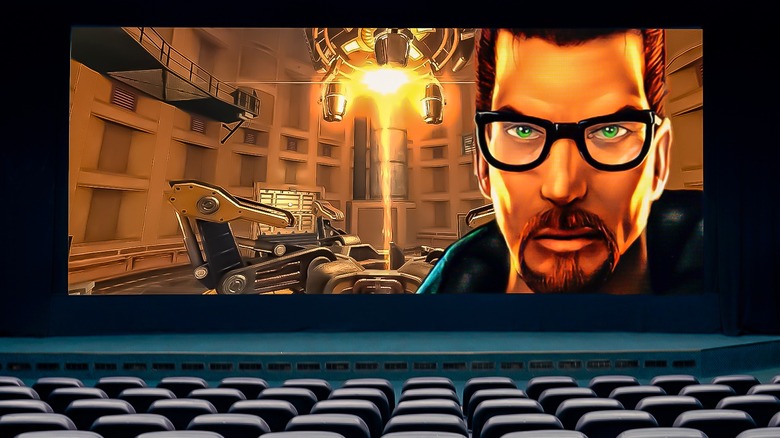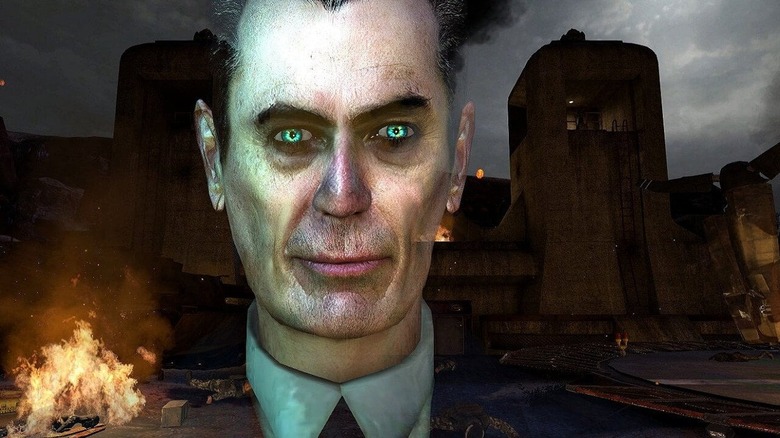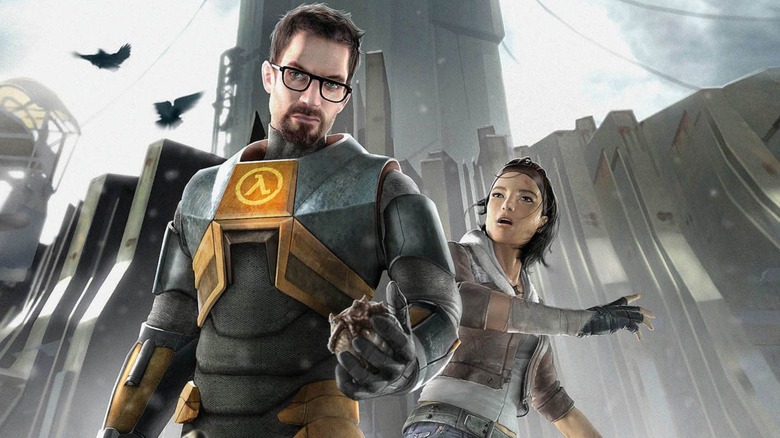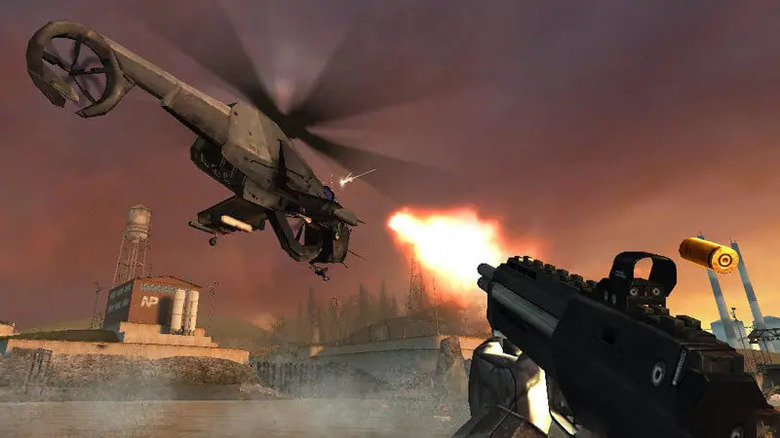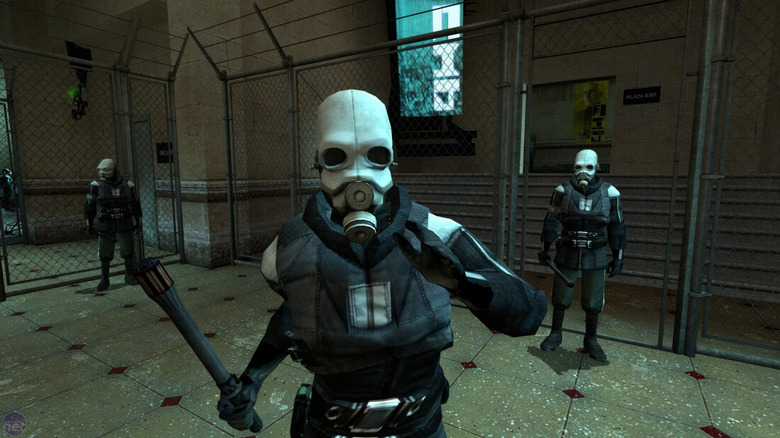Half-Life Could Be The Next Great Video Game Movie - If It Breaks The Game's One Big Rule
To paraphrase the G-Man, the right video game adaptation in the wrong place can make all the difference in the world. And while the heyday of "Half-Life" may have faded, it could still be that adaptation. The famed first-person shooter series is still as fondly remembered today for its influence on modern game design as it is for disappointing failure to release a proper third installment. However, maybe the time is perfect for this franchise to return to us in the form of a great live-action video game movie?
At face value, "Half-Life" seems ripe for a screen adaptation. Its complicated saga of parallel universes, mysterious alien empires, and a Ph.D. who murders monsters with a crowbar has all the makings of a modern sci-fi classic.
Of course, there's also one glaring obstacle. Gordon Freeman, the beloved player character of the games, is a longtime sufferer of silent protagonist-itis. He's the archetypical shooter lead from the late 1990s and early 2000s: a man who carries the fate of the universe but has no discernable attributes to speak of. For obvious reasons, that would need to change in a "Half-Life" movie or TV series. It's tough to craft a compelling protagonist without any real personality. However, the video games have already laid the groundwork for a more nuanced and robust version of Gordon Freeman. With recent gritty video game adaptations like "The Last of Us" finding massive success in the mainstream, "Half-Life" could be the next series to make the big jump.
Half-Life has all the makings of a modern sci-fi classic
These days, roughly every other story in Hollywood involves the multiverse. But when the first "Half-Life" was released by Valve in 1998, parallel universes weren't quite as in vogue. To justify its setting — a secret government research site experimenting with theoretical physics — the game put players behind the eyes of a proper scientist. Both the original and "Half-Life 2" shattered expectations for storytelling in the shooter genre, introducing a cinematic design style that changed the industry. By today's standards, though, the games can feel a bit dated.
Fortunately, the story of the games is more relevant now than ever. Not only are modern audiences far more accustomed to multiverse narratives, but the rest of the "Half-Life" story is also strikingly contemporary. At its core, it's Crichton-esque: a look at how unchecked scientific "progress" can harm humanity more than it helps. In "Half-Life 2," the story also becomes downright dystopic, with Gordon fighting for a rebel faction against a trans-dimensional alien empire occupying Earth. You want grim sci-fi storytelling in the vein of "The Last of Us?" We got it. You want zany alien designs and J.J. Abrams mystery boxes? We've got those too.
"Half-Life" is more important for its innovative design than for its story. But the story is the reason fans still rave about it, decades later. The games' specific brand of science fiction is exactly what Hollywood is looking for today, and with video game movies finally getting good, "Half-Life" could be next.
A new Gordon Freeman could have unforeseen consequences
The big issue with a "Half-Life" movie or TV series, of course, is that Gordon Freeman doesn't talk. He has never, ever talked. In fact, in the grand pantheon of silent video game protagonists, Gordon might be the patron saint. But don't worry — it's not as big of an issue as you might think.
While Gordon may not have any catchphrases or discernable personality traits, he does play a huge role in the story. Unlike the player character in 1993's "Doom," he has a clear and unique purpose, a reason for being at the center of the action, and interesting relationships with the other characters in the games. Even without dialogue, he's an intriguing character, which is part of why the series has remained so popular.
Just imagine this: You're a 27-year-old Ph.D. aiding some of the greatest minds in theoretical physics at the top-secret Black Mesa Research Facility. One day, an experiment you're assisting with tears a rift open to an alien world, allowing monstrous beings to leap through to Earth. On the run from both the invaders and the U.S. agents sent to cover up the catastrophe, you end up freeing a trans-dimensional alien race from slavery and becoming a legendary warrior. Years later, under orders from an enigmatic god-like figure, you return to lead the human resistance against a massive multiversal empire.
There's so much character potential in that story. How does Gordon feel about the destruction he helped create? Are there moments when he can't help but feel awed by the horrifying things Black Mesa released? The other characters can still bear the brunt of the dialogue, and Gordon can maintain his strong, silent persona. Making him into a real protagonist wouldn't even demand that many changes.
A Half-Life film adaptation could finally address the games' unfinished story
Okay, so to be fair, there is one other big obstacle to a "Half-Life" movie or TV series. In addition to Gordon Freeman's distaste for human speech, there's the fact that "Half-Life 3" has been in video game limbo for ages. "Half-Life 2" begat two miniature "episodes" that continued the story, and a VR spin-off called "Half-Life: Alyx" was released in 2020. But the proper third act, the game that was teased so many times it became a meme, never arrived. In 2017, a former Valve writer even leaked story details for what "Half-Life 2: Episode 3" would have been, as the game itself seemed doomed never to debut.
The unfinished nature of the "Half-Life" story could actually be a strength in adaptation — provided Valve were to ever let a studio have the rights. There'd be instant interest from fans at the mere promise of a conclusion. Even the earlier parts of the story could be enhanced by the knowledge of what comes later. Characters like the G-Man, the Vortigaunts, and the Combine themselves could be explored in greater detail from the start without messing up any preexisting lore.
If the adaptation never reached the supposed "Half-Life 3" portion of the story, it would be hilariously true to the source material. And if it were to actually see the narrative through to the end, we'd finally have a conclusion to celebrate. A win-win!
What a Half-Life movie or TV series could look like
As of now, a live-action "Half-Life" adaptation is purely speculation. However, it's not hard to picture what it could look like. In addition to legit video game adaptations like "The Last of Us," there are plenty of other contemporary dystopian sci-fi series that could provide inspiration. From the high-concept storytelling of Apple TV+'s "Foundation" and Netflix's "Altered Carbon" to the sci-fi mysteries of Prime Video's "Tales from the Loop," the modern streaming landscape is filled with similar sagas.
Of course, nothing gets people's attention quite like a movie. The best adaptation route for "Half-Life" might be a film covering the first game, followed by a series for the "Half-Life 2" stories. The original is a much faster-paced adventure story, while the sequel gets more into the politics of alien occupation and rebellion. It's the same model that Netflix claims to be using for its upcoming "Gears of War" adaptation, and it would be a great choice for the Valve franchise as well.
A movie-TV combo would also work well for streaming, which is probably an adaptation's best bet. While massive in the gaming space, "Half-Life" isn't quite a big enough name to justify a modern theatrical Hollywood budget. But a streaming film that leads into a prestige sci-fi drama? That's a format the current entertainment landscape is well versed in. All we need now is for Valve to quit being stingy and start shopping around those rights. Sadly, given the history of "Half-Life 3," the odds may not be in our favor.
